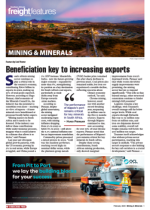Importers of mining equipment and spares, and the logistics companies responsible for their customs clearing and forwarding, face several challenges, one of which is the delays at South African ports. This is according to Marlon Reddy, Turners Shipping’s Gauteng branch manager.Mining is an important contributor to the economies of countries in sub-Saharan Africa, representing around 7.5% of South Africa’s GDP. Increased costs and low margins are squeezing mining profitability, which makes efficient and cost-effective logistics more important than ever. Delays at ports lead to supply-chain disruptions, which impact projects and operations in the mining industry. Out-of-gauge cargo is often on chartered vessels, where delays translate into higher costs.“There has always been speculation about South Africa losing business to east coast ports like Maputo and Beira; well, it has become a reality,” says R eddy.Longer sailing times to these ports are mitigated by the reliable and quicker turnaround times once the cargo reaches land-side. Upgrades to ports, and road and rail networks have made this possible.“This situation is making us work harder to keep the business we have and attract new business,” says Reddy, who has worked in the logistics industry for over 30 years.This task is made more difficult as South Africa’s freight volumes declined to 150 million metric tons in the 2022/23 financial year from 226 million tons in 2017/18. Reddy explains that Turners Shipping’s project cargo division ensures that once the cargo is in their hands, the movement to its destination is completed as seamlessly as possible.“Routes are planned and liaison with road traffic authorities and border officials is done ahead of time, ensuring all permits and authorisations are in place.”However, there is room for optimism. Import manager Sagie Govender is hopeful about the future: “Transnet is aware of the problems and has a turnaround strategy, which was strengthened by loans from the African Development Bank and the Brics bank in the middle of last year.”The loans, totalling over R20 billion, have been earmarked for capital investment and the implementation of the recovery strategy.“With all of this, we are optimistic that the business that has slipped away from South Africa can be won back,” says Govender. LV

